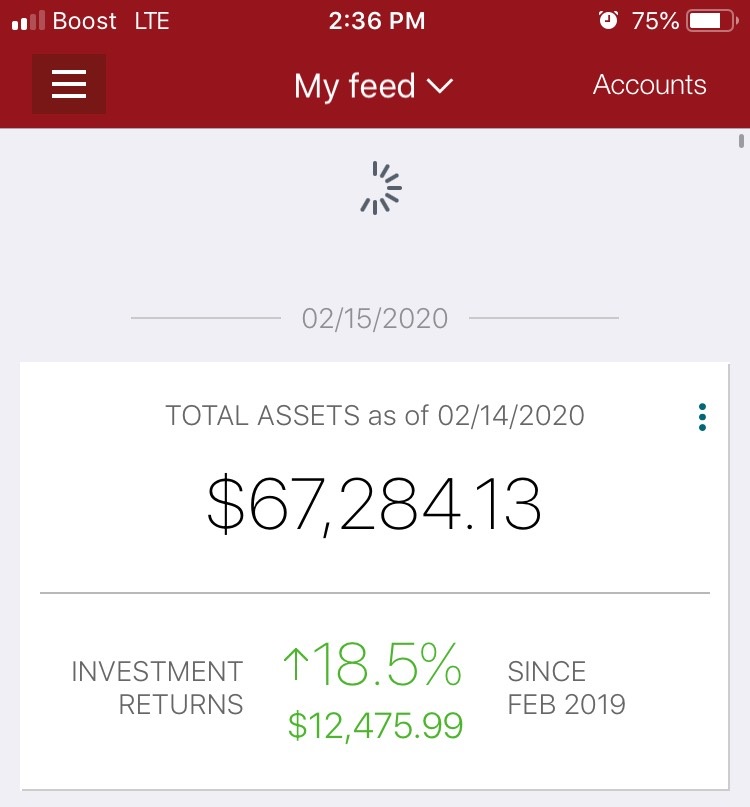Yes, It’s Time to Invest!!
On a particular Saturday I grabbed snacks at the grocery store, met up with a couple friends for a movies, and got dinner afterwards (even with the popcorn filling me up). That same day, my investments paid out enough dividends to cover the day’s entire spend… with even some to spare.
It’s days like that one where my good fortune is staring me in the face. What’s even better is that it doesn’t even take a fortune to secure that good fortune! Those dividends all came from ONE index fund. The amount in it at the time was in the low five figures – as in, more than ten thousand, but not by much. That amount seems like a massive, even unattainable, sum to some, and yet it will literally PAY YOU MORE MONEY if you treat it correctly.
Should You Invest, Though?
Similar to questions about budgeting is this topic about investments. Everyone’s heard horror stories of investments going belly-up or transforming into scams, leaving good people with suddenly nothing to their name. Knowing that, would I still recommend it’s time to invest?
In a word: yes. Wholeheartedly.
But not in anything that’s a get-rich-quick scheme or MLM gamble. We’re going to do investing over the long term.
The only money you shouldn’t be investing is what’s in your emergency fund (which is $5,000 for me) in case of, as you might’ve guessed, an emergency. You’ll also want to keep any money you’ll need in the near-future in the bank instead of investing it (i.e. if you’re planning a big purchase in the next year or two).
If you’re young, you should definitely take the time to invest. If you’re old, you should definitely invest too. Us youngins have a massive time horizon on our side, and the money generated over 20-40 years is exponentially higher than that over 5-10 years. With that said, not all is lost if you’re older and suddenly realizing you need to save. Just take a listen to this podcast where Mama Purple recounts how she started saving at 50 and STILL managed to retire early!
The Catches and Caveats of Investing
Those horror stories of losing it all only happens to folks who don’t fully understand the caveats of investing. There are countless ways you can invest, ranging from entertainment-worthy investments like buying into small companies (looking at you, Shark Tank) to some very niche methods like buying part of an artwork or song.
For most investments, you need to consider at least two things: the projected return on investment (ROI) and how you’re going to measure that over a period of time. Actually, three things: you also want to consider how risky this investment is or not. The riskier the investment, the higher your ROI might be… assuming, of course, said investment doesn’t crash and burn.
If you don’t understand what you want out of those three things, you’re not gonna have a good time. If you don’t understand what’s a reasonable return, you’re not gonna have a good time. This is why so many people are leery of the US stock market; it seems like this behemoth beyond human understanding, one that sucks you dry if you’re not a bloodsucker yourself. But that’s only if you don’t define your period of time, which should be something you measure over a year or so with something like stocks. For more on the basics of the stock market, here’s one of my favorite writeups on it.
That being said, if I were you I wouldn’t buy stocks straight out of the gate. That is NOT your best option for your first investments. Why would you gamble on any of them when there’s no guaranteed way to pick the winners? Even the “safest” companies of the past still went belly-up.
Understanding Your Best Investment Options
Don’t lose hope though, because there actually IS a way to pick the winners. It’s called an index fund, and that’s what’s going to give you a double-digit average return. It has for me with my Vanguard-offered fund:

An index fund is basically a group of only the best-performing stocks on the market. This group, over the next year, will consist of losing stocks, stocks that do okay, and stocks that go up like crazy. You don’t know which company stocks belong to which category, but exhaustive studies let you know what returns this group averages out to: ten percent, or seven percent after inflation.
Yes, some years will have a much higher rate of return. In 2019, index funds tracking the S&P 500 gave you a 28% return – for every four dollars you put into that fund, you got an extra dollar on top of that for “free”. Some years, however, will have a much LOWER rate of return. 2018’s ROI was a negative six percent. Funny enough this still averages out to an 11% ROI overall, as it has for my accounts since I started investing in early 2017.
There are two ways index funds pay you back: via dividends and via growth. Dividends are from companies who actually pay their investors, which is nice of them and gives you cash money early on. Growth is from how much more valuable your investments are in a period of time. You’ll see this happen if a company stock is $50 today and $55 tomorrow. Eventually you’ll sell off some of your funds for a tidy profit, but the longer you hold onto them the more money you’ll make.
If you think you can handle seeing your investments dip in the lower years, index funds is where it’s at. Some people are really nervous about investing and will put more money in something like bonds instead. That’s fine as well, as it’s even harder to lose money with bonds. However, they have a lower return so keep that in mind.
How do You Get Started?
Mosey on down to my disclaimer page if you’d like the legal jargon, but keep in mind I’m not a licensed professional dispensing corporate-approved wisdom. I’m just a weirdo who’s seen the results of good money practices and decided to share the wealth with you.
Now here’s the fun part: if you’ve followed my advice on budgeting and securing a higher-paying job, you’ll have extra savings to use for long-term wealth. I’d use Vanguard for those savings, both because they have some of the best funds and because I really like their founding principles of putting customers first instead of billionaire shareholders. You can follow this link to get started and check out what they offer. I personally invest in their VTSAX fund, which requires a $3,000 amount to begin investing. If that’s too much for you currently, go with their VTI fund instead. Every year you’ll pay 0.04% of your portfolio value to maintain it – this means you’ll pay about $4 for every $10,000 you have invested, which definitely beats the smarmy mutual fund advisors who require 1% or more.
And that’s it! Once you put your money into an index fund like the one for the S&P 500, you’re plugged in to the overall stock market and will watch your investments grow! Again, the earlier you get this done the better off you’ll be down the road – I’ve mentioned before that not having as much invested one year ago has cost me SIX FIGURES of money down the line!
I’m cool with this because I wasn’t interested in busting my ass to hit that so quickly. But do you feel the same? Are YOU cool with losing out on four, five, six figures of wealth because you chose not to work on it?

